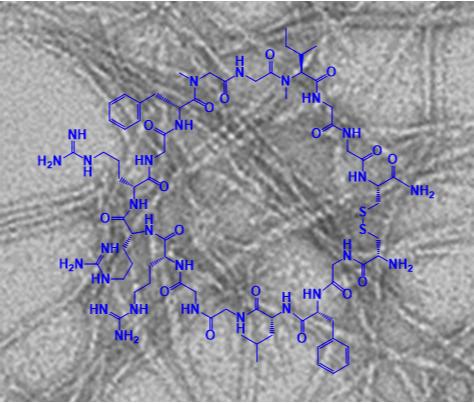Alzheimer's disease and diabetes: Hope for inhibitors against amyloid plaques

A new class of designed macrocyclic peptides has been developed which are highly potent inhibitors of amyloid plaque formation. Picture: Kapurniotu/ TUM
Amyloid plaques, which are protein deposits, play a crucial role in the development of Alzheimer's disease and type 2 diabetes. Several teams of scientists around the world are working on finding ways to prevent amyloid plaque formation in the human brain.
The research team of Aphrodite Kapurniotu, Professor for Peptide Biochemistry (TUM) has been working on an idea for some time now in collaboration with the teams of Professor Martin Zacharias (TUM), Professor Gerhard Rammes (TUM Rechts der Isar Hospital) and Professor Jürgen Bernhagen (Institute for Stroke and Dementia Research (ISD) at Ludwig Maximilian University (LMU)). The researchers present now macrocyclic peptides (MCIPs) as potent inhibitors of amyloid formation; they reported their results in the journal “Angewandte Chemie”. The work has been supported by Deutsche Forschungsgemeinschaft (DFG) collaborative research center SFB 1035.
New class of amyloid inhibitors
In its new study, the team presents macrocyclic peptides, developed as a new class of amyloid inhibitors. “We have discovered an MCIP that is stable in human blood plasma and can also overcome the human blood-brain barrier in an in vitro cell culture model,” explains Professor Kapurniotu.
She adds: “So far we were 'only' able to demonstrate these properties in the test tube – thus further research is necessary. But these are two highly desirable properties for inhibitors of Alzheimer's amyloid.”
TUM has already applied for a patent for the newly developed macrocyclic peptides. “They could be a good alternative to the currently pursued antibody-based approaches as therapeutics against Alzheimer's amyloid plaque formation because they are easy to produce, have promising properties and, due to their peptidic nature, they will be significantly cheaper than antibodies,” says Professor Kapurniotu.
“Therefore, further investigations are now planned to verify whether the MCIPs are also effective in in vivo models. Furthermore, the MCIPs could also be suitable as templates for the development of small molecule peptidomimetics (molecules mimicking peptide chains), which might also find application as anti-amyloid drugs in Alzheimer's and type 2 diabetes.
Further information:
The research work was funded by the German Research Foundation (DFG) within the SFB 1035.
Prof. Dr. Aphrodite Kapurniotu
Technical University of Munich
Division of Peptide Biochemistry
Phone: 0049/8161/713542
Mail: akapurniotu@wzw.tum.de
http://pbch.wzw.tum.de/index.php?id=9
Publication:
Anna Spanopoulou, Luzia Heidrich, Hong‐Ru Chen, Christina Frost, Dean Hrle, Eleni Malideli, Kathleen Hille, Alexandros Grammatikopoulos, Jürgen Bernhagen, Martin Zacharias, Gerhard Rammes and Aphrodite Kapurniotu: Designed Macrocyclic Peptides as Nanomolar Amyloid Inhibitors Based on Minimal Recognition Elements, Angew Chem Int Ed Engl. 06/2018.
DOI: 10.1002/anie.201802979.
https://www.tum.de/nc/en/about-tum/news/press-releases/detail/article/34885/
Media Contact
All latest news from the category: Life Sciences and Chemistry
Articles and reports from the Life Sciences and chemistry area deal with applied and basic research into modern biology, chemistry and human medicine.
Valuable information can be found on a range of life sciences fields including bacteriology, biochemistry, bionics, bioinformatics, biophysics, biotechnology, genetics, geobotany, human biology, marine biology, microbiology, molecular biology, cellular biology, zoology, bioinorganic chemistry, microchemistry and environmental chemistry.
Newest articles

Machine learning algorithm reveals long-theorized glass phase in crystal
Scientists have found evidence of an elusive, glassy phase of matter that emerges when a crystal’s perfect internal pattern is disrupted. X-ray technology and machine learning converge to shed light…

Mapping plant functional diversity from space
HKU ecologists revolutionize ecosystem monitoring with novel field-satellite integration. An international team of researchers, led by Professor Jin WU from the School of Biological Sciences at The University of Hong…

Inverters with constant full load capability
…enable an increase in the performance of electric drives. Overheating components significantly limit the performance of drivetrains in electric vehicles. Inverters in particular are subject to a high thermal load,…





















